World Cup watchSouth Africa says visitors to World Cup will be safe
The World Cup tournament will not give South Africa the economic bounce it was hoping for; the organizers were hoping for between 1.2 and 1.5 million visitors, but only 250,000 foreign soccer fans decided to make the trip; at least, the organizers say, the visitors will be safe; South Africa leads the world in all categories of violent crime (the murder rate in the country is eight times higher than that of the United States), but South Africa has poured $180 million into World Cup security preparations, including $89 million on equipment such as helicopters, water cannons, patrol vehicles, and body armor

World Cup 2010 logo // Source: topnews.in
When South Africa was named in 2004 as the host of next week’s World Cup, the country was a decade into democracy. South Africa was still recovering from forty-six years of apartheid rule, which deprived its black majority of economic and political rights and left a legacy of violent crime. Skeptics said the country lacked the infrastructure, manpower, and money to stage a secure tournament.
Six years later, the government and FIFA say the country is ready to welcome teams and fans from around the globe and, more important, will keep them safe. Fears about safety., however, have already inflicted a heavy blow on the games: FIFA was hoping for between 1.2 and 1.5 million visitors — that is, non-South Africans — to cone to the tournament, but only about 250,000 will come. In order to avoid the embarrassment of empty stadiums, FIFA has been selling tickets at deep discounts to South Africans. South Africa has invested about $5 billion in readying the infrastructure for the games, and the absence of foreign visitors means that the economic bounce the games were supposed to provide the South African economy will not happen.
USA Today’s Alyssa Owens quotes South African Police Service (SAPS) spokesperson Vish Naidoo to say that “We are ready for any eventuality, from terrorism threats down to petty crime.”
South Africa has poured $180 million into World Cup security preparations, according to SAPS. This includes $89 million on equipment such as helicopters, water cannons, patrol vehicles, and body armor.
South Africa’s murder rate has declined somewhat since 2004, but it is eight times higher than that of the United States. In Gauteng, a province which is home to 10.5 million people and the World Cup host cities Johannesburg and Pretoria, there were 1,940 violent crimes reported for every 100,000 people in 2008.
Owens notes that the violent crime rate in Michigan, which has a similar population, was nearly one-fourth that number.
While crime in South Africa is commonly portrayed in media reports as an attack against the white minority, much of the violence is confined to townships, underdeveloped areas on the peripheries of the city. Still, there is a fear that criminals will prey on foreigners in the host cities. Naidoo said the main deterrent to petty crime will be increased visibility of police.
There will be 44,000 officers assigned to tournament-related duties, Naidoo said. They will oversee route security, border control and crowd management. That is in addition to the more than 100,000 officers carrying out normal duties, Naidoo said.
Naidoo said the police would also be working with Interpol and security agencies from the United States and all other countries sending teams for the tournament. FIFA provides its own security inside the stadiums.
Several recent high-profile violent crimes have renewed fears surrounding spectator safety. In March, racial tensions flared after the murder of white supremacist Eugene Terre’Blanche. In April, strip club owner Lolly Jackson was gunned down near Johannesburg.
Police Minister Nathi Mthethwa said Monday that there was no terror threat for the World Cup, dismissing an earlier report about an alleged al-Qaeda militant plotting an attack.
The U.S. State Department issued an alert last week to Americans traveling for the event. “While a number of terrorist threats against the World Cup in South Africa have appeared in the media, the U.S. government has no information on any credible threat of attack that any individual or group is planning to coincide with the tournament,” the State Department said.
